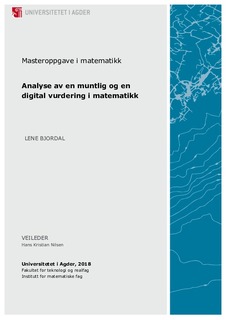| dc.contributor.author | Bjordal, Lene | |
| dc.date.accessioned | 2018-09-21T08:28:50Z | |
| dc.date.available | 2018-09-21T08:28:50Z | |
| dc.date.issued | 2018 | |
| dc.identifier.uri | http://hdl.handle.net/11250/2563826 | |
| dc.description | Masteroppgave matematikkdidaktikk MA502 – Universitetet i Agder 2018 | nb_NO |
| dc.description.abstract | The aim of this study is to analyze two different forms of assessment; an oral test and an
assessment using the web-based program “Multi Smart Øving”. This study is based on the
research question: How do the students express their knowledge through an oral and digital
assessment in mathematics? In order to answer this, it was considered appropriate to split the
research question into two questions. The first focuses on how one can relate an oral and
digital assessment in mathematics to principles of “good assessment”. To answer this, the six
criteria described by Engh, Dobson and Høihilder (2007) is used. The next question focuses
on the mathematical understanding which is expressed through an oral and digital assessment
in mathematics. This is answered mainly by the description of procedural and conceptual
understanding (Hiebert & Lefevre, 1986), as well as the theory of cognitive demands of
mathematical tasks (Stein, Grover & Henningsen, 1996; Valenta, 2016).
The study is based on the use of different qualitative research methods. Observation was used
to obtain insight in how the web-based program and the oral test was used as assessments in
mathematics. In addition, interviews were conducted with the teacher who used the oral test
and four of his students, in addition to the teacher using the web-based program and three of
his students. The tasks presented in the two assessments were also collected and a document
analysis was carried out.
The results of the study are based on the analysis and the discussion of the findings. It appears
that the students to the greatest extent get to express their procedural knowledge in the use of
“Multi Smart Øving” as a form of assessment. With the use of the oral assessment in
mathematics the students get to express their conceptual knowledge to the greatest extent. In
both forms of the assessments, the students will express their knowledge in a manner that
coincides with five of the six principles of “good assessment”. | nb_NO |
| dc.language.iso | nob | nb_NO |
| dc.publisher | Universitetet i Agder ; University of Agder | nb_NO |
| dc.rights | Attribution-NonCommercial-NoDerivatives 4.0 Internasjonal | * |
| dc.rights.uri | http://creativecommons.org/licenses/by-nc-nd/4.0/deed.no | * |
| dc.subject | MA502 | nb_NO |
| dc.title | Analyse av en muntlig og en digital vurdering i matematikk | nb_NO |
| dc.type | Master thesis | nb_NO |
| dc.subject.nsi | VDP::Samfunnsvitenskap: 200::Pedagogiske fag: 280::Fagdidaktikk: 283 | nb_NO |
| dc.source.pagenumber | 93 s. | nb_NO |

